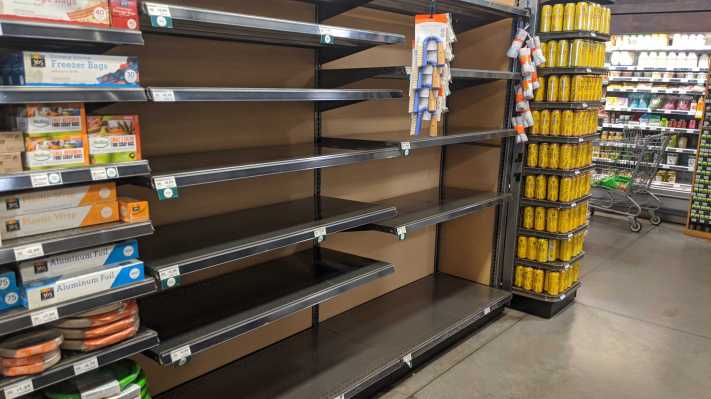Products You May Like
Hivery, a startup that bills itself as an “optimization platform” for retailers, today announced that it raised $30 million in a Series B round led by Tiger Global, the embattled private equity firm, with participation from Blackbird Ventures, AS1 Growth Partners and OneVentures. CEO Jason Hosking told TechCrunch via email that the proceeds will fuel the growth of products designed to help brick-and-mortar businesses make decisions about physical space and product displays.
The pandemic and its effects on retail, including strained supply chains and product shortages, have thrown a spotlight on the challenges that the industry faces. For example, according to a recent survey by Retail Insights, seven out of 10 consumers believe that stockouts — events that cause inventory to be exhausted — are worse today than they were during peak pandemic-induced panic buying.
Hivery has its origins in the pre-pandemic era — the Australia-based company was founded in 2015 — but Hosking argues that many of its technologies have become more relevant over the last several years. “Today, if you walk into one of the major retail chains in the U.S., chances are you’re selecting products off shelves that have made it there using Hivery’s core product,” he told TechCrunch. “It sits between the big brands and retailers, enabling them to customise a store’s assortment to match the needs of the local consumer. We call it ‘hyper-local retailing.’”
Overstocks, out-of-stocks and returns cost retailers $1.75 trillion globally in inventory losses, according to a 2020 study by IHL Group.
Hosking and Franki Chamaki, Hivery’s second co-founder, were among the inaugural members of Coca-Cola’s now-shuttered entrepreneur in residence program, Founders, where they were charged with building new business models leveraging Coke’s distribution network and brands. After a partnership with Australia’s CSIRO Data61 research organization to apply AI techniques to sales data from vending machines, Hosking, Chamaki and two collaborators they met at Data61 — Matthew Robards and Menkes van den Briel — were inspired to launch Hivery. (Data61 is the data and digital technologies arm of the Commonwealth Scientific and Industrial Research Organization, Australia’s national science agency.)
As Hosking explained, currently the retail industry focuses on three areas in developing and executing assortment plans in-store: product category strategy (i.e., finding the right products for a store), category planning and optimization and planogram design and creation. These steps together are called “category resets” or “merchandising resets.” Resets typically take around 6 months and involve large teams of people, with feedback from both retailers and suppliers.
“The retail environment is becoming increasingly complex,” Hosking said. “With the ever-growing number of SKUs, limited shelf space, different store characteristics, and current supply chain issues and complexity, it’s getting extremely difficult to get the assortment right.”
Hivery sells two software-as-a-service products aimed at expediting the reset cycle by delivering “space-aware” assortment optimization. In retail, “assortment optimization” refers to the process of selecting the right mix of products to stock on store shelves. The first, Hivery Curate, takes into account factors like capacity, merchant-defined rules and visibility to recommend where products should be placed in displays on a store-by-store basis. As for the second, Hivery Enhance, it recommends space and assortment for vending machines in the U.S. and Japan.
Hivery’s newest product, Hivery Promote, which is currently in beta, generates promotion calendars, learning from sales data while considering things like supplier constraints, price points, and promotion types.
“With Hivery, supplier-side sales teams can simulate and discover win-win category strategies with their retail buyers; marketing teams can simulate new item success prior to launch; and retailers can localize assortment and reduce food spoilage by, say, optimizing for food expiry,” Hosking said. “C-level executives care about Hivery as it helps them drive a far more strategic relationship between them and their key retail partners.”
Hivery competes with a number of vendors tackling different inventory delivery challenges within brick-and-mortar stores. Last September, Flieber raised $12 million for its inventory optimization technology that uses analytics and machine learning to estimate ideal stock levels across sales channels and inventory locations. Just a month later, Toolio landed $8 million for its cloud-based merchandising and inventory planning software. Meanwhile, on the grocery side, there’s startups like Freshflow, which is developing AI-powered forecasting algorithms to help retailers optimize stock replenishment of fresh, perishable goods.
But Hivery says that in the last 2 years, 20 of the top 25 consumer packaged goods manufacturers have become its clients and that it’s on track to more than double the client base in 2023. Annual recurring revenue stands at $8 million, Hosking said, while Hivery’s team across the U.S. and Australia is set to grow to over 150 people within the next 12 months.
“Hivery has been able to help our clients weather headwinds purely by enabling rapid and effective decisions regarding assortment and space. We are helping our customers to react quickly, be more data-driven, and efficiently provide consumers what they want,” Hosking said. “As a result of the pandemic, there has been an industry wide increase in demand for automation and optimisation-based solutions, which we have been able to provide.”
The challenge for Hivery will be overcoming economic headwinds extending well into next year. Global investment in retail technology dipped 11% to $23.8 billion in Q1 2022 compared to $26.6 billion in Q4 2021, according to CB Insights. While store management technology saw a bump in funding, increasing by 10% to $2.3 billion quarter over quarter, it remains to be seen whether it’s a lasting trend.
